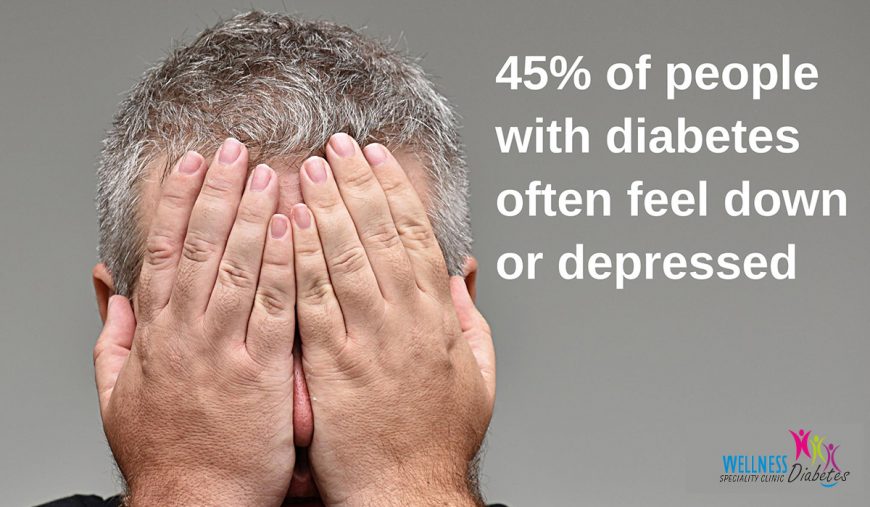• Depression is a very real condition and is becoming increasingly common in the general population; approximately one in four people will experience depression sometime in their adult life. For people who live with diabetes, this figure is even higher.
• Up to 50% of people with diabetes are thought to also have a mental illness such as depression or anxiety.
• People with depression and diabetes may find it hard to maintain daily diabetes care
What is Depression?
Depression is not just low mood but a serious illness. People with depression find it hard to do normal activities and function from day to day. Depression has serious effects on physical as well as mental health.
Link between diabetes and depression
Research shows that having diabetes more than doubles the risk of developing depression. Living with a chronic condition like diabetes, coping with biological and hormonal factors plus needing to manage the condition on a daily basis may increase the risk of depression.
Depression can increase the likelihood of developing diabetes complications. People with depression may find it harder to deal with everyday tasks. Over time, managing diabetes (regular blood glucose testing, taking medication, following a healthy eating plan and regular physical activity) can take its toll. This may increase a person’s risk of depression, which may, in turn, lead to their usual diabetes care being neglected.
Feelings & behaviours
A person may be depressed if for more than two weeks they have:
• Felt sad, down or miserable most of the time OR
• Lost interest or pleasure in most of their usual activities and
• Experienced symptoms in at least three of the following four categories:
Behaviour
• Stopped going out
• Not getting things done at work
• Withdrawn from family and friends
• Relying on alcohol and sedatives
• Stopped doing things you enjoy
• Unable to concentrate
Thoughts
• “I’m a failure”
• “It’s my fault”
• “Nothing good ever happens to me”
• “I’m worthless”
• “Life is not worth living”
Feelings
• Overwhelmed
• Guilty
• Irritable
• Frustrated
• Unhappy
• Indecisive
• Disappointed
• Miserable
• Sad/tearful
Physical
• Tired all the time
• Sick and run down
• Headaches and muscle pains
• Churning gut
• Sleep disturbance
• Poor appetite/weight loss
Treatment
Depression is just like any other illness, it can be treated. Treatment can lift depression and improve diabetes control.
Looking after your diabetes will help decrease the risk of getting depression. If you already have depression, good diabetes management will help lessen the negative impacts it can have. Depression is no different to any of the other complication of diabetes. It is a genuine illness for which you need to seek help and support from health professionals.
The treatment for depression and diabetes involves a coordinated approach that monitors both diabetes control and the symptoms of depression. It is about finding the treatment that works best for each person. For example, people with diabetes and mild depression may find that regular physical activity improves depressed moods and also helps control blood glucose levels.
The most effective treatments combine psychological and medical care. Talk to your doctor about how you are feeling and discuss whether a referral for psychological support is appropriate. Support is vital and can come from a number of sources such as friends, family, community groups and your Credentialled Diabetes Educator.
Your doctor or health professional will take into account several factors when suggesting the most suitable treatment for you. Regular contact with, and ongoing assessment by your doctor to check that your treatments are working effectively is an important part of becoming and, staying well.
Helping yourself
If you suspect you might have depression, take control of your health by:
• Going to a doctor or other health professional
• Getting involved in social activities
• Engaging in regular moderate physical activity
• Learning about depression and diabetes
• Eating healthily and including a wide variety of nutritious foods
• Achieving and maintaining a healthy weight
• Limiting your alcohol intake
• Getting help, support and encouragement from family and friends
• Asking your doctor to check your blood pressure, cholesterol and blood glucose levels.
Getting help & more information
If you or someone you know needs help, talk to your doctor or other health professional about getting the right advice and support. For further information contact:
Wellness Diabetes Speciality Clinic: +91-8451831119

